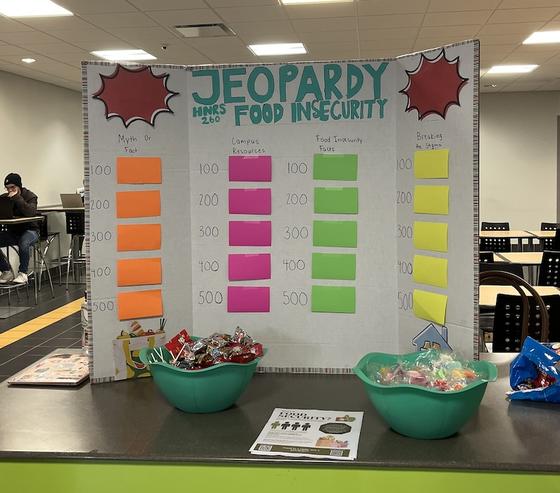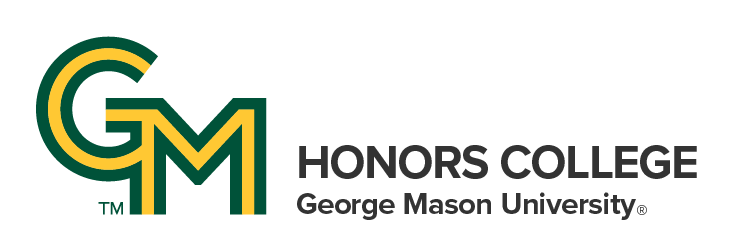At college campuses across the nation, as many as 30-40% of students grapple with food insecurity, unable to consistently access nutritious and culturally relevant meals due to financial constraints.
At George Mason University, students in Tawnya Azar’s Honors College 260 Society and Community Engagement course are focused creating awareness campaigns around hunger and food scarcity. The course aims to empower students through writing and collaborative efforts, fostering a critical examination of the challenges surrounding food access and inspiring tangible solutions. Other community engagement course sections engage students on topics such as civic engagement, philanthropy, and using dialogue for understanding and connection.
Azar partnered with George Mason’s Patriot Pantry and Greenhouse and Gardens Program where students completed 15 hours of volunteer work as part of the class.
The course explores different models of community engagement including the approach of mutual aid, a community-based system where both parties involved benefit, which Azar says is “arguably the direction the field is heading in. Mutual aid is the more effective model for serving a community's needs.”

“George Mason’s students continue to be more and more diverse, coming from different backgrounds, and as the economic pressures that they face increase, food insecurity is also going to increasingly become an issue in this country, especially among college students,” said Azar, term associate professor in the Department of English.
“We also have to have challenging conversations about what the limitations to everyone having access to free nutritious meals or to reliable, nutritious meals all the time can look like,” said Azar.
“Although there can be a lot of negative stigma and stereotypes associated with the issue, many of my students very generously shared experiences they or family members have had with access to reliable, nutritious food sources,” she said.
Another one of their community partners is Community of Faith Food Pantry in Herndon, which recently received a commendation from the state of Virginia via the state legislature for the work they’ve done to address food insecurity.
Azar, who previously worked for Community of Faith, said the organization offers fresh produce, meat, eggs, and dairy products and serves about 300 families every week. They rely exclusively on volunteer support and charitable donations, she said.
The students developed an awareness campaign to inform members of the George Mason community about food insecurity as well as increase awareness and access to existing food resources for food insecure community members.
Junior Mehmood Shajih called the class “the most important Honors course I’ve taken because it’s talking about an issue that is so prevalent in colleges.
“It taught me that about 40% of college students face food insecurity throughout their four years, which I was very surprised to learn,” said the psychology major who worked with the Greenhouse and Gardens Program.
“It also allowed me to explore different ways to help out, but then this class goes a step further because we also approach it through community writing and group campaign tables that we did across the George Mason campus, where we passed on the information we were obtaining in class,” he said.

The student groups were able to get creative in their outreach efforts, making interactive games in the format of the Jeopardy! game show in the Johnson Center, which included questions about food insecurity.
Through this course, senior biology major Rori Martinez-Breitenstein started volunteering at a Fairfax food bank, Food for Others, completing tasks such as picking up donations from grocery stores and local vendors and packing lunches for K-12 students experiencing food insecurity in Fairfax County.
“I find working with Food for Others very rewarding, and I've also had the opportunity to make a lot of connections with different people who are also there because they want to support the community,” said Martinez-Breitenstein, who is also volunteering at George Mason’s Potomac Heights Organic Vegetable Garden tending to the vegetables.
Martinez-Breitenstein is also a residential advisor on the Fairfax Campus and is collaborating with Patriot Pantry on a food and resource drive, collecting non-perishable food items as well as personal hygiene products for students in the residence halls who might not have access to these products otherwise, she said.
“I'm passionate about public health. My main goal will always be working toward making sure everyone has equitable access to the necessary resources for their highest level of health and quality of life,” said Martinez-Breitenstein, a public health minor.
Shajih and Martinez-Breitenstein say they plan to continue working with these organizations even after completing the course and hope to get their family and friends involved in community service as well.
“I’m honored to be involved in something that's bigger than myself,” said Martinez-Breitenstein.
Related Stories
- January 20, 2026
- January 12, 2026
- January 7, 2026
- December 26, 2025
- December 26, 2025
